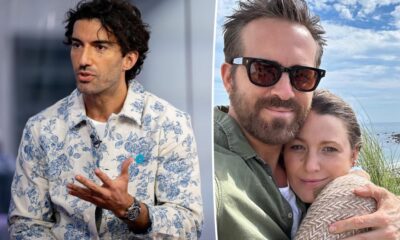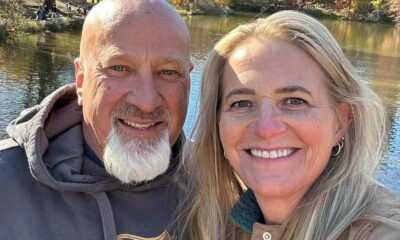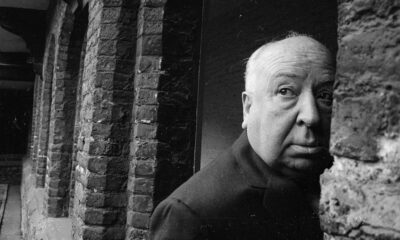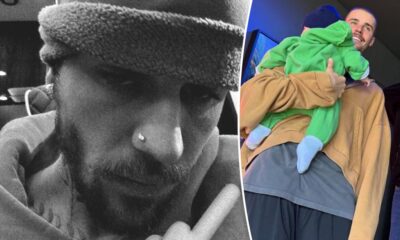Entertainment
Simple Minds Almost Passed on ‘Don’t You (Forget About Me),’ Thought Iconic Hit Would Be a Mistake (Exclusive)

NEED TO KNOW
- The documentary ‘Simple Minds: Everything Is Possible’ details the history of the legendary Scottish rock band
- Highlights from the film include their formation during the late-’70s punk-rock era, their popularity in the 1980s and the creation of their biggest hit, “Don’t You (Forget About Me)”
- The band is currently touring North America
Mention Simple Minds to most music fans, and the first thing that most likely comes to mind is “Don’t You (Forget About Me).” The memorable song from the 1985 movie The Breakfast Club that went to No. 1 in the U.S. and catapulted the Scottish rock band to superstardom. But as their lead singer Jim Kerr remembers, Simple Minds weren’t initially sold on recording a track they didn’t write themselves, but was co-written by Billy Idol producer Keith Forsey and Steve Schiff.
“Keith Forsey had come to one of our gigs, and no one had really made a formal introduction,” Kerr, 65, tells PEOPLE. “We had just come off [the stage], and I think Keith had a few drinks. This guy was ranting and raving, and no one was quite sure what he was talking about. But anyway, he gave [keyboardist] Mick McNeil a cassette and said, ‘I want to work with you guys, and there’s a thing coming up.’ You meet guys like that, but you’re never quite sure who’s real and who’s not. Anyway, Mick didn’t bother taking the cassette out of his bag. So weeks went past, [and] they didn’t hear anything from us.”
The story behind “Don’t You (Forget About Me)” is one of the major highlights of the documentary, Simple Minds: Everything Is Possible. Directed by Joss Cowley, the film was released in theaters and on-demand on June 13 and comes as the band — led by Kerr and guitarist Charlie Burchill, 65 — is currently on an extensive North American tour for the first time in 40 years.
“People really want to know the story, and if you don’t do it, someone else is going to do it,” Kerr says about the film. “It was a little overwhelming to begin with because you think no one’s going to capture the essence of the early days, especially working with a young director. But I think they did a great job of conjuring up what it meant to be growing up in Glasgow [during the 1960s and 1970s] and having these dreams and seeing it come to fruition, and inevitably the ups and the downs. We were very pleased.”
Everything Is Possible, which features commentary from Bob Geldof, Molly Ringwald and Depeche Mode’s David Gahan, traces Kerr and Burchill’s coming-of-age years during the punk-rock explosion in the late 1970s, leading to their first group, Johnny and the Self Abusers, and then Simple Minds.
“From the first gig, we made it clear we wanted to be a great live band,” Kerr says. “We wanted to take it around the world. It’s given a great purpose to our lives.”
As the band’s story is told in the documentary, Simple Minds gradually ascended the U.K. charts with their first four albums, whose sounds were a mixture of post-punk and art rock. A gradual build culminated in the band’s breakthrough record, 1982’s New Gold Dream (81/82/83/84).
“We’d had the mix right,” says Kerr. “You take all your influences and you use that as your ground soil. But eventually you have to grow something of yourself out of that. Certainly that was the case with us. It was a matter of growing something out of our influences to the point where it finally rises and you go, ‘Okay, that’s the sound of Simple Minds fully fledged.’ I think that New Gold Dream is the case in point.
While Simple Minds were having success in the U.K. and Europe, America was a tough to crack for them during the early years. That changed with “Don’t You (Forget About Me).” Not only did producer/songwriter Forsey want the band to do the song for The Breakfast Club, but so did their American record label A&M.
“They said, ‘This thing came up, and it’d be great for you to be involved,’ and they’re very keen to have you. It’s a movie, blah, blah, blah,’ “ Kerr says. “We said, ‘Okay, that sounds great.’ They said, ‘All right, we’ll send you the song.’ We said, ‘Hang on a minute, what song? We write our own songs.’ And they said, ‘No, no. There’s a song written to go with a script, and it’s this guy Keith Forsey.’ We said, ‘Hmm, we don’t really do [other] people’s songs, but let’s check it out.’ ”
“It didn’t blow us away,” Kerr continues. “It sounded like it could have been the Psychedelic Furs. We were working on stuff [for our next album, Once Upon a Time] that was exciting us much more. We were saying, ‘Look, can’t you just take one of our songs we’re working on just now?’ They said, ‘No, no, no. This is the song for the script.’ I was listening to it thinking it’s not the kind of lyric I would identify with. But all the nervousness went away once we really met the people involved. And Keith came across a lot more coherent [when we met] with him.”
What also helped was the band getting a phone call from the film’s director John Hughes. “They were incredibly enthusiastic,” Kerr says. “And basically we said, ‘Let’s go in for an afternoon and see how we can Simple Minds-ify the song.’ That’s what happened. It was done in like three hours. Not only did we give it the big, Simple Minds anthemic sound that we were working with at the time, but we brought in the whole ‘la-la-la-la’ coda and all this stuff. By the end of the session, we were all looking around thinking, ‘I don’t know what we have here, but it sounds pretty good.’ And here we are decades later, talking about it.”
The year 1985 was a banner one for Simple Minds. It included the releases of Don’t You “(Forget About Me)” and the Once Upon a Time album (featuring the hits “Alive and Kicking” and “Sanctify Yourself’) as well as their appearance at Live Aid, which is another highlight of the documentary. “It was an exciting day [with] all those names, and you’re getting to play,” Kerr says. “You’re not really thinking, ‘God, this is the biggest televised event in history’ and all that stuff. So yeah, it’s been an honor to look back and think, ‘God, we were involved in that.’ ”
After completing the tour behind Once Upon a Time, which saw the group playing stadiums for the first time, Simple MInds’ music turned reflective and politically and socially conscious with 1989’s Street Fighting Years.
”As a writer,” Kerr recalls. “you think, ‘Hey, you’ve grown up a bit. You feel you’ve got a view on the world, you’ve traveled the world, you’ve noticed the big themes in the world, and lo and behold, there they are in the music. You want to reflect on them. It’s less about just you.’ There’s a time when you want to reflect on the world around you as you see it. And for us, that was the case with Street Fighting Years.”
The documentary also looks at the difficult period in the 1990s and 2000s when the band faced personnel changes, the departure of their manager and a shifting musical landscape — a time that made Kerr almost consider ending the band.
“Whenever Charlie and I talk about it,” says Kerr, “Charlie will say, ‘No.’ And I say, ‘Charlie, I did.’ And he’ll say, ‘Yeah, but only for the weekend.’ There’s no doubt it got tough. When a new generation comes along, you’re going to get it in the neck because everyone’s had enough of you. You’ve had your time. It all goes down to: Do you just go around like punch-drunk boxers because you don’t know what else to do? Or do you sort of realize what’s going on? What are you still in it for?”
Both Kerr and Burchill concentrated on other things in their lives, such as Burchill raising his kids “We kept writing, and we waited things out,” says Kerr, who has two children, including daughter Jasmin, with ex-wife Chrissie Hynde of the Pretenders.
“Sooner rather than later, the phone started ringing again. ‘A festival in Australia wants you.’ ‘Japan wants you to tour.’ A new generation comes along and they see things differently,” Kerr adds. “The internet comes along, and certainly you’re able to get in touch. Maybe even though the media’s not interested in writing about you anymore, you can get in touch directly with people who are still interested.”
Simple Minds have been on a creative roll with their last few studio albums, recording and touring with newer players in the band. Their current Alive and Kicking tour has been positively received. “Particularly in America, it’s like we still feel we’ve got a ton to prove,” Kerr says. “So it feels very much we’ve got a lot of getting on with. That’s first and foremost before anything else.”
Never miss a story — sign up for PEOPLE’s free daily newsletter to stay up-to-date on the best of what PEOPLE has to offer, from celebrity news to compelling human interest stories.
Kerry says there will be a point when Simple Minds will eventually call it a day; as he once said in the film, “great stories need great endings.”
“We love what we’re doing,” he further explains. “Why would you walk away from that? Well, the only thing is that it’s so overwhelming. Everything else gets shunted to the side. Your family doesn’t see you. There’s a time you think, ‘Nah, I’ve been selfish enough.’ It is on the horizon. It just doesn’t have a date. We’ll be honest with our fans and say, ‘This has been amazing. We’re going to go one more time and give people a chance to say goodbye,’ whenever that is — rather than, as I say, fritter away. Who knows what the reality will be?”
Simple Minds: Everything Is Possible is now playing in select theaters and available on demand.
Read the full article here

-

 Entertainment7 days ago
Entertainment7 days agoPrison Break Reboot: All About the Hulu Series Starring Emily Browning and Lukas Gage
-

 Entertainment6 days ago
Entertainment6 days agoCynthia Erivo Wows the Crowd in 10 Show-Stopping Outfits as She Hosts the 2025 Tony Awards: See Everything She Wore!
-

 Celebrity4 days ago
Celebrity4 days agoBianca Censori’s lookalike sister Angelina becomes part of Kayne West’s squad as she joins them in Japan
-

 Celebrity6 days ago
Celebrity6 days agoJudge tosses Justin Baldoni’s $400M lawsuit against Blake Lively, Ryan Reynolds in shocking legal twist
-

 Celebrity7 days ago
Celebrity7 days agoAmal Clooney piles on pearls to join George on Tony Awards 2025 red carpet
-

 Entertainment6 days ago
Entertainment6 days agoTony Awards 2025 Winners List: Nicole Scherzinger, Maybe Happy Ending and More Take Top Prizes
-

 Entertainment6 days ago
Entertainment6 days agoSister Wives’ Christine Brown Explains Why She Decided to Have Sex with David Woolley Before Getting Married
-

 Royals5 days ago
Royals5 days agoBrooke Shields’ podcast interview criticizing ‘too precious’ Meghan Markle taken down
















